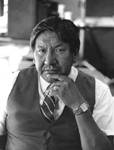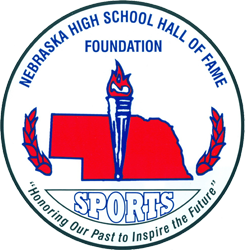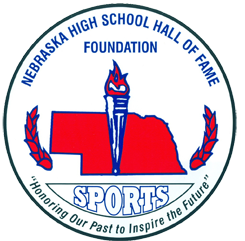
Athlete. 1957. From the high plains of northwest Nebraska came this legendary long distance runner, a 1957 graduate of Gordon High School in Sheridan County. At his best in the mile run at the state track & field meets in Lincoln, he won the all-class gold medal twice and the Class B mile three times. His senior year at the state meet, then held in Memorial Stadium, with the fans standing and cheering him on, Joe American Horse set a Class B record in the mile of 4.28.1. After high school he was a student at the University of Nebraska who competed for UNL in cross country and in 1959 placed sixth in the Big Eight Conference meet, leading the Huskers to their best finish since 1940.
Joe is the first Native American to be inducted into the Hall of Fame. Joe competed in an era when an athlete could only run in one race over 440 yards and one can only guess what he could have accomplished had the rules been the same as today. By all accounts, Joe was a real crowd pleaser when he ran in meets. He would get standing ovations on every lap and deafening cheers when he crossed the finish line. One sports writer maintains that he would have broken Bill Mountford’s state record if he would have someone pushing him.
Story by Indian Country Today, April, 2000
OGLALA, S.D. – In 1959, on a gray and rainy spring day, two Oglala Lakota athletes stood side by side on a track in Lincoln, Neb. The stadium, more notorious for hosting Cornhusker football games, was about to witness a quiet milestone.
Down on the track the 2 mile race was ready to start. The Lakota men, Billy Mills of Kansas University and Joe American Horse of the University of Nebraska, were ready to run. The gun sounded and the duel began. Silently, the two men kept pace with each other: 5 laps, 6 laps, 7 laps – just one to go. Rounding the corner for the final 220 yard sprint, American Horse was right on Mills’ shoulder.
Mills began his kick. American Horse struggled gamely, then fell back. After the race the two acknowledged each other with smiles and a friendly hand shake. The following year at the Tokyo Olympics, Mills would shock the sports world with a gold medal in the 10 thousand meter run, the last American to win at that distance in 40 years. Meanwhile, American Horse would go on to become one of the few two time tribal presidents in Oglala Lakota Tribal History.
In the case of Billy Mills, thousand of words have followed his worthy deeds, and rightly so. The career of Joe American Horse has been less well known, though in its way, his story is equally inspiring. With American Horse’s pending induction into the Nebraska High School Sports Hall of Fame this Oct. 8, that oversight will at least be partially corrected. The Oglala resident will be the first Native American so honored.
American Horse began his track career in the 8th grade at tiny Gordon High School just south of the Pine Ridge Indian Reservation. At his first practice the youth, barely a teenager, competed in a mile race against the high school runners. “I came in second, and I don’t know who was more surprised – them or me,” said American Horse.
The former tribal chairman admits the recollection has a storybook quality to it. “It’s like what I saw in the movies. When I was a kid they took me to see Burt Lancaster play Jim Thorpe. I always wanted to be like that. Here, at least in a little way, it seemed like it happened.”
The following spring it happened in a bigger way. In his freshman year in high school, American Horse placed second again, this time at the state track meet in Lincoln. Recalling that day, the elderly Lakota relived his awe. “It was in Cornhusker Stadium you know – they used to have track meets there. There was thousands of people everywhere. It was a little overwhelming.”
Eventually, by dint of his growing prowess, American Horse was able to get used to it. American Horse placed first in the mile at the next three consecutive state track meets. As a sophomore he won it with a time of 4:43.6. His junior year he clocked in at 4:28.9, and broke a record for the class B mile that had stood for 32 years. By his senior year, the Lakota youth had developed a following that included Omaha World Herald sportswriter Gregg McBride. Running under wet and windy conditions, the Gordon High School senior finished the race in 4:28.1. McBride called the mile the best ever run by a Nebraska high school athlete.
An old and, by today’s standards, odd regulation in those days prevented American Horse from gaining even more victories. Runners at that time were only allowed to compete in one race that was a half-mile or longer. Still, American Horse anchored his high school’s mile relay team to a state championship in 1957.
Perhaps because of his feats in Lincoln, Neb., American Horse was given a track scholarship to attend the University of Nebraska. Besides receiving two letters in track there, he led the university’s cross country team to its best Big 8 Cross Country finish in 19 years. Finally in 1960, American Horse set an indoor 2 mile record of 9:24.6 and an outdoor record of 9:18.2. Both performances were University of Nebraska records at the time.
Recently, in an interview, American Horse revealed he has slowed down some. The 61 year old confessed he pulled a muscle while out on a 6-mile jog. “I finished the run, but it still hurts a little bit. I may have to cut back on my distance a little,” he said. While his running may no longer be world class (he was ranked 10th in the nation as a miler in 1960) the former tribal chairman does show up in some unusual places. He gave a recent speech on economic development at the University of Chicago. More recently, he delivered another speech on the same topic at Frankfurt University in Germany.
Economic development on Indian reservations is now the baton Joe American Horse carries. And, in his usual quiet and confident way, when he talks about it he smiles. Much the way he used to smile in stadiums over 40 years ago.

